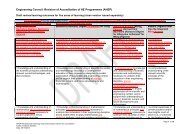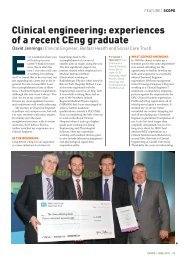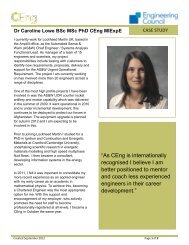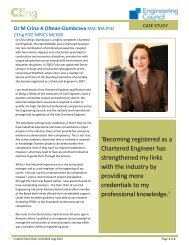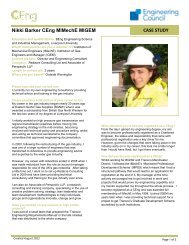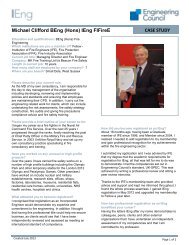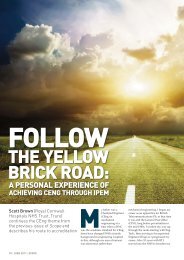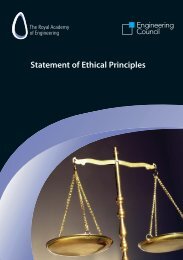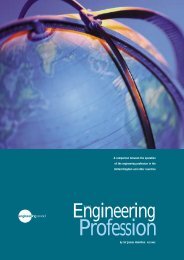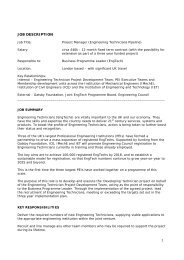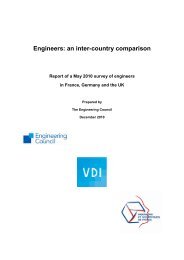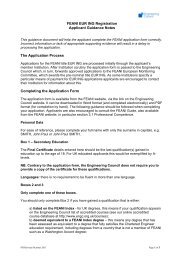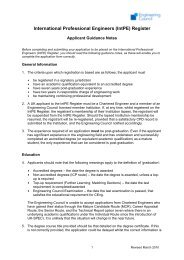An Engine for Change - A Chronicle of the Engineering Council
An Engine for Change - A Chronicle of the Engineering Council
An Engine for Change - A Chronicle of the Engineering Council
You also want an ePaper? Increase the reach of your titles
YUMPU automatically turns print PDFs into web optimized ePapers that Google loves.
212A CHRONICLE OF THE ENGINEERING COUNCILInstitution <strong>of</strong> Mechanical <strong>Engine</strong>ersThe relationship between <strong>the</strong> <strong>Engine</strong>ering <strong>Council</strong> and <strong>the</strong> Institutions has varied over <strong>the</strong>years. There were times, particularly in <strong>the</strong> early days when <strong>the</strong> <strong>Engine</strong>ering <strong>Council</strong> seemedto be a body operating separately from <strong>the</strong> Institutions. In more recent times it has becomemuch more <strong>of</strong> a partnership at least at <strong>the</strong> operational level.John Whitwell, Clive Holtham and myself being asked by Keith Foster to try to identify abetter grouping <strong>of</strong> Institutions. We did but it was not to everyone’s liking and was not takenup. Out <strong>of</strong> this came <strong>the</strong> concept <strong>of</strong> DABCE as a single accrediting body.Institute <strong>of</strong> Marine <strong>Engine</strong>ers*In early 1992 a <strong>Council</strong> <strong>of</strong> Presidents <strong>of</strong> all <strong>the</strong> <strong>Engine</strong>ering Institutions agreed to set up asteering committee under Sir John Fairclough, <strong>the</strong> <strong>the</strong>n chairman <strong>of</strong> <strong>the</strong> <strong>Engine</strong>ering <strong>Council</strong>,to chart a way <strong>for</strong>ward <strong>for</strong> <strong>the</strong> engineering pr<strong>of</strong>ession.The Unification Steering Group consisted <strong>of</strong> <strong>the</strong> 1991 Presidents <strong>of</strong> <strong>the</strong> ICE, IMechE, IEE,IChemE, IMarE, IIEE, and <strong>the</strong> Institute <strong>of</strong> Plumbing, with a Project Director and withSecretarial support seconded from <strong>the</strong> DTI. The Group reported in 1993 in a report entitled“<strong>Engine</strong>ering into <strong>the</strong> Millennium”. Subsequently joint <strong>Engine</strong>ering <strong>Council</strong>/Institutionworking parties were established to modify <strong>the</strong> recommendations <strong>of</strong> <strong>the</strong> Report and topropose an implementation plan. The plan was implemented in 1994. It was subsequentlymodified, as a result <strong>of</strong> fur<strong>the</strong>r discussions between <strong>the</strong> Institutions and <strong>the</strong> new <strong>Engine</strong>ering<strong>Council</strong>, and a new way <strong>for</strong>ward entitled “Building on <strong>the</strong> Lasting New Relationship” wasagreed in 1999.The vision <strong>of</strong> <strong>the</strong> Unification Steering Group was <strong>of</strong> a strong <strong>Engine</strong>ering <strong>Council</strong> and anumber <strong>of</strong> Colleges to cover <strong>the</strong> full span <strong>of</strong> <strong>the</strong> pr<strong>of</strong>ession. The Colleges would beresponsible <strong>for</strong> all Learned Society activities and <strong>for</strong> most, perhaps all, <strong>of</strong> <strong>the</strong> Education andTraining needs <strong>of</strong> <strong>the</strong> Pr<strong>of</strong>ession. It was envisaged that <strong>the</strong> <strong>Council</strong> would be largely directlyelected by <strong>the</strong> Registrants, would be responsible <strong>for</strong> standards, registration and codes <strong>of</strong>conduct, would be <strong>the</strong> Voice <strong>of</strong> <strong>the</strong> Pr<strong>of</strong>ession and would be <strong>the</strong> principal point <strong>of</strong> contactwith Government and Industry. The overriding aim was to give Registrants a strong sense <strong>of</strong>corporate unity (engineers first, marine engineers second) by giving <strong>the</strong>m a sense <strong>of</strong>ownership <strong>of</strong> <strong>the</strong> pr<strong>of</strong>ession.I think that it is fair to say that everything that has happened since <strong>the</strong> 1993 report has had <strong>the</strong>effect <strong>of</strong> watering it down to <strong>the</strong> extent that <strong>the</strong> situation now is not markedly different from<strong>the</strong> starting point. If anything <strong>the</strong> larger Institutions have streng<strong>the</strong>ned <strong>the</strong>ir grip on <strong>the</strong>pr<strong>of</strong>ession and <strong>the</strong> Registrants have been fur<strong>the</strong>r distanced from <strong>the</strong> notion <strong>of</strong> a unifiedpr<strong>of</strong>ession - if only because <strong>of</strong> <strong>the</strong> dismantling <strong>of</strong> <strong>the</strong> ECRO and <strong>the</strong> failure <strong>of</strong> <strong>the</strong> Institutionsto make <strong>the</strong> PEIs (what a title) a relevant <strong>for</strong>ce in <strong>the</strong> country.I am not in a position to respond authoritatively within <strong>the</strong> suggested framework. Myimpression is that <strong>the</strong> relationship <strong>of</strong> <strong>the</strong> IMarE with <strong>the</strong> <strong>Engine</strong>ering <strong>Council</strong> is marginallybetter than it was, but it must be said that in <strong>the</strong> Bad Old Days we regarded <strong>the</strong> <strong>Engine</strong>ering<strong>Council</strong> as our friend and protector against <strong>the</strong> cohorts <strong>of</strong> <strong>the</strong> Big Three plus <strong>the</strong> IChemE.© <strong>Engine</strong>ering <strong>Council</strong> UK 2004



